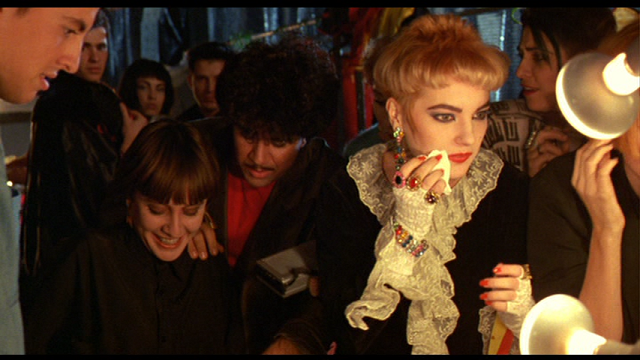Pedro Almodovar had an early reputation of being an Enfant Terrible. He was a michevous director who made melodramatic comedies with a sharp wit that nevertheless delved into the dark taboo territories of humanity and sexuality. He frequently delves into homosexuality, trangenderism, violence, sexual assualt, rape, and murder. In the more modern era of movie watching, Almodovar can get himself into trouble; I’m So Excited was a bubbly shallow comedy that included a happy-go-lucky orgy with a woman raping a drugged-out non-consenting passenger.
What usually saves Almodovar from getting into trouble is the depth of his characters and the understanding that their actions are problematic but stem from a deeply human source. Unfortunately, that’s not the case with Matador, a weird fable of mystic fate and violently erotic sex. Where Almodovar usually expands his stories to hint at a larger life outside of the story on screen, here the characters never expand beyond their stock conventions.
Matador, a film that was re-released with an NC-17 rating, opens with a man furiously masturbating to a supercut of women being explicitly violently murdered and mutilated. We’re not talking about a vague horrorshow compilation, but women having their heads cut off, their throats slashed and other atrocities done to their body. The man masturbating is Diego Montes (Nacho Martinez), a limping ex-matador who was forced to leave behind his exotic career of massacring bulls after he was gored in the pelvis (a later scene with him wearing that night’s outfit shows the fabric ripped just barely far enough from his penis to not be perverse). These erotic fantasies of killing women remind Diego of his past days seducing and killing bulls in tight clothing while being adored by all.
Diego Martinez’s erotically violent nature is mirrored by Maria Cardenal (Assumpta Serna), a lawyer who seduces random men on the street before killing them. She sees herself as a female matador, luring men to their fate before she spears them with the snake-like dagger that she holds in her hair. If Diego is reliving his past glories, she’s trying to reclaim glories denied to her. Though they haven’t met, these two form a yin and yang of unholy erotic killers trying to find their ultimate destiny.
The two people caught between our star-crossed killers are emotional cripples themselves. Angel Jimenez (Antonio Bandaras), one of Diego’s students, is a young man who has been brainwashed into a spiritual and sexual dead end by his severely devout Catholic mother. He looks up to his mentor so much that he tries to prove his strength by raping Diego’s girlfriend, Eva (Eva Cobo), at knife point. Eva, who gets off on Diego’s dangerous eroticism, feels more pity than anything for Angel who never penetrates, cums on her leg, then faints out of guilt.
There’s a bunch of spiritual mumbo jumbo about an upcoming eclipse and Angel having visions, but nothing ever really deepens the characters. These characters go through Almodovar’s plot points, but aren’t given the room to breathe. The movie is so packed with rote exposition and noir development that the characters almost become the writer’s pawns rather than living their personal truths. Besides the violent sexual misanthropy (both misogyny and misandry are on full display here), which is never fully justified or validated, Matador doesn’t have that easy-going Almodovar chill that usually makes the most distasteful subject matter palatable.
Almodovar considers Matador, his fifth feature film, one of his weakest entries. He’s not wrong, but even his weakest entries have some amazing set pieces. Whenever the movie kicks into perverse eroticism, Almodovar’s focus on two lithe bodies grinding into each other is never less than fetishistic. Perhaps the best sequence of the film is one that has no weight on the story itself. In the middle of the movie, Pedro Almodovar makes a cameo appearance as a frantic fashion designer trying to finalize his collection as he’s being interviewed by a reporter with no sense of timing and managing heroin-addicted models shooting up under a clothing rack. It’s one of the few moments of levity that has no gravity on the proceedings. Beyond these spare delights (and a non-frontal naked Antonio Bandaras), Matador gives insight into how Almodovar’s successful films function by providing a proper counter-example as one that isn’t successful at all.

